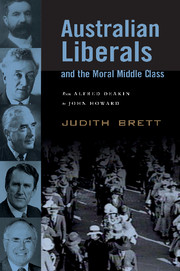Book contents
4 - Good Citizens and Public Order
Published online by Cambridge University Press: 22 September 2009
Summary
Service
Australian Liberals saw themselves first and foremost as good citizens, and they firmly believed that it was on their virtues as citizens that the quality of the nation and, beyond that, the Empire was based. The previous chapter has argued that the Australian Liberal conception of citizenship, with its stress on independence of judgement, on loyalty, and on the subordination of self-interest to the national good, was based on Protestant conceptions of virtues in which Australia's Irish Catholics were regarded as deficient. Already suspect at the time of the formation of the party system and generally identifying with the only non-sectarian party on offer, Australian Catholics' alliance with the Labor Party was consolidated by the conflicts of World War I. While the polemical thrust of the previous chapter was to expose the patterns of sectarian thought and feeling Australian Liberalism brought to the formation of the Australian party system, it had another, more positive implication. Sectarianism in Australia before World War II was not mainly about fighting Catholic vices, but about affirming Protestant virtues. Most of the time, when anti-Catholic feeling was latent, Protestantism was still at work in the Liberal imagination, giving weight to Liberalism's promotion of the political, social and economic virtues of independent individualism and responsible citizenship against Labor's class-based understandings.
- Type
- Chapter
- Information
- Australian Liberals and the Moral Middle ClassFrom Alfred Deakin to John Howard, pp. 57 - 85Publisher: Cambridge University PressPrint publication year: 2003

